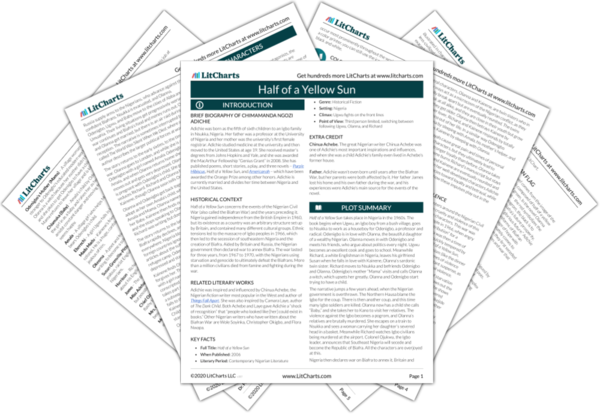Summary
Analysis
Richard goes to Obosi and finds Nnaemeka’s family. He tells them what happened at the airport, and they say they have already had a funeral for Nnaemeka. They expect Richard to have brought gifts, as would have been traditional, but he hasn’t. He realizes he has been “caught up in himself,” thinking that his mere appearance would make a difference to the grieving family.
Richard is unique among his English compatriots, but he often gets caught up in his own uniqueness and expects any amount of sympathy he shows towards Africans to be automatically praiseworthy.
Themes
Richard still feels ashamed that he has remained sane and normal after what he saw at the airport. His Aunt Elizabeth sends him English articles about the Nigerian massacres, with phrases like “ancient tribal hatreds” in them. In response Richard starts writing an article, and he explains that there was no “age-old hatred” between the Igbo and Hausa people, but rather that Hausa's distrust of the Igbo was stirred up by Britain decades before as part of its “divide-and-rule” policy.
This condenses much of the political argument of this part of the novel. It is easy for the British media to continue to dehumanize Africans and point to this violence as a sign of their “savagery,” when in reality Britain is the root cause of the violence. The tribes had lived alongside each other for centuries without ever having a massacre like this.
Themes
Richard is nervous about what Kainene thinks of his article, as she has been acting distant again, but she says it makes her feel proud. He sends his article to the Herald, but they reject it and want more gory details about the massacres. Richard is frightened that he might just be a “voyeur” to Nigeria’s trouble, as the massacres are still external to him. He finds himself unable to write about the airport scene.
Richard is correct that he is still an outsider and has the privilege of escaping Nigeria’s problems if he wants, but he shows his humanity and goodness in genuinely trying to empathize with Kainene and the other Igbo. The British media is only interested in selling stories, not disrupting the status quo.
Themes
When the secession is announced Richard realizes he is trembling. He feels that he has an identity as a Biafran in a way that he could never as a Nigerian, because he was here for the birth of Biafra. He intends to ask Kainene to marry him, but he cannot say it aloud.
Richard shares in the naïve optimism of the secession, believing that he is a “true Biafran” because he was there at the beginning – even though he is totally safe from the dangers to the Igbo.
Themes
Get the entire Half of a Yellow Sun LitChart as a printable PDF.

People start preparing for the possibility of war – Nigeria fighting to take back Biafra – but no one really believes it will happen. Richard is sure that Nigeria will leave the Igbo alone after the massacres, and even be glad to be rid of them. There is a meeting at the university about “In Case of War” and Richard sees Olanna there. They talk awkwardly, and Richard says he has changed his book title to “In the Time of Roped Pots.”
At the original creation of Nigeria the Muslim North had wanted to secede from the Christian South, but Britain held the country together because of the oil in the South and the autocracy in the North. Nigeria might have indeed approved of the secession were it not for oil and foreign interests.
Themes
Suddenly everyone starts excitedly saying that Colonel Ojukwu is coming. Ojukwu eventually appears on the university lawn and gives an inspirational speech, while the crowd chants “Power! Power!” Ojukwu warns of the possibility of war, and says that such a war may be long and drawn out. The crowd affirms that they are ready to fight. Ojukwu lights a cigarette and throws it onto the lawn, saying “Even the grass will fight for Biafra.”
The naïve optimism of most of the Biafrans focuses on the figure of Ojukwu, as the country becomes fanatically loyal to him. His boastful claim that “even the grass will fight for Biafra” (which is taken from an actual historical quote of his) is tragically prophetic, since famine and starvation will play such a large role in the war.
Themes
Back at home, Richard describes Ojukwu to Kainene, and he tells her that he saw Olanna at the conference. Kainene responds by saying “war is coming.” Port Harcourt seems thrown into a frenzy, as people indulge in last-minute pleasures before the hardships of war begin.
Kainene is as usual the most clear-headed character, and the only one who doesn’t seem immediately infatuated with Biafra and Ojukwu. People had recently been denying the possibility of war, but now they are counting on it.
Themes












